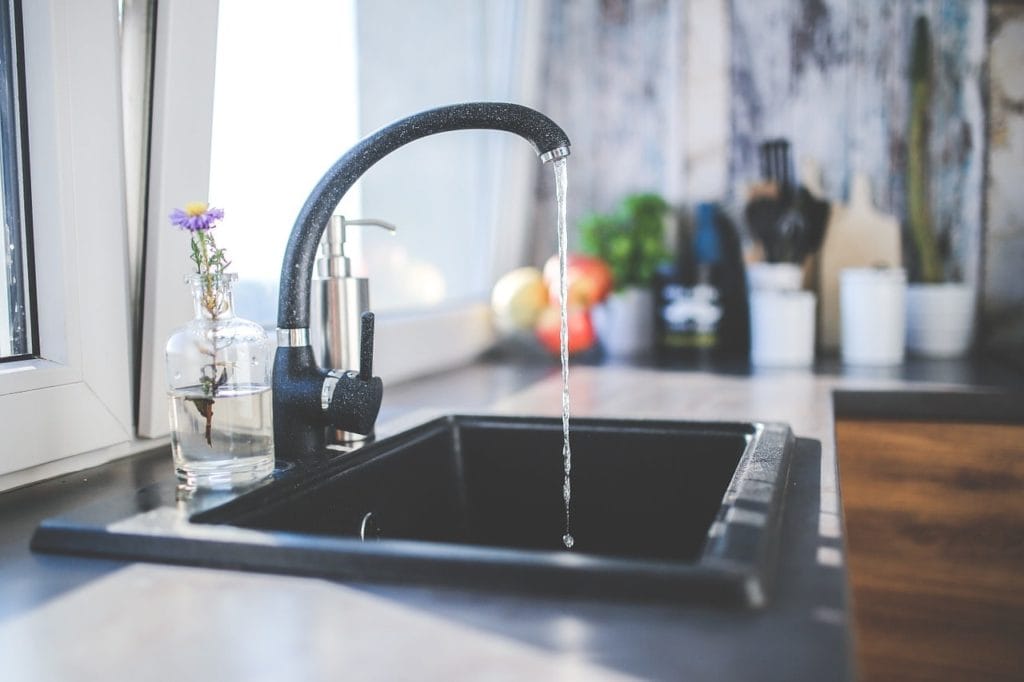The classic stainless steel sink is a thing of the past. Modern kitchens are equipped with sinks in different colors that match the design of the kitchen and contribute to the overall modern look. The black sink is a classic for the modern kitchen and is the choice of many design-oriented homeowners. What is not mentioned in the kitchen catalog, however, is the care that a black sink requires. Read on to learn how to clean a black sink and remove limescale and dirt so it always looks new.

Table of Contents
Tips for Cleaning a Black Composite Sink
Black sinks are a beautiful design piece for the kitchen, but they have one major disadvantage: stains and dirt are immediately visible on them. Even before you clean your kitchen sink with a commercial cleaner, you should think twice. Because different rules apply to black sinks than to classic sinks.
Pay attention to the material
Before you go to work cleaning your black sink, you need to know what material it is made of. A black basin can be made of high-quality materials such as ceramic, granite or quartz composite, although inexpensive versions are often made of coated stainless steel. In the second case, it is a colored coating that can peel off over time, causing unsightly stains and the sink will need to be replaced.
Black sinks made from high-quality materials are very durable, but you need to clean and maintain them properly to avoid accidentally damaging them.
Clean your sink daily
To keep your black sink looking new, it should be cleaned regularly. For best results, try to clean the sink after each use. Regular cleaning does not even require any special cleaning agents – even a sponge with a little mild washing-up liquid (without bleach) is sufficient.
Cleaning and wiping down your sink after each use, or at least daily, can reduce the hassle of deep cleaning.
Keep the kitchen sink dry to prevent deposits
Leaving water in the sink is a sure way to keep it from looking clean. Water can discolor your sink, not to mention the stains and limescale it can leave behind. Plus, it can wear down the surface of your sink and leave dull stains all over it.
Luckily, this is easily avoided by simply keeping your sink dry. Dry the sink after each use and do not leave water in it for a long time. When you clean the black sink, you should make sure that it is also completely dry. Do not use any abrasive cloth for this. Instead, opt for a soft cloth, e.g. B. made of microfiber that will not scratch your sink.
Tip: Avoid leaving wet sponges or tea towels in or near your black sink. These can leave soap scum and water stains. If you have hard water, they can also contribute to the formation of limescale.
Don’t clean your sink with these agents
More important than what you should do when cleaning your sink are the things you shouldn’t do. Although composite sinks are inherently strong, black models can be damaged fairly easily if you use the wrong cleaning products. To avoid accidentally damaging your kitchen sink, never use the following cleaning products.
Chemical power cleaners
Harsh cleaning agents are not recommended for cleaning black composite sinks. These cleaners contain chemicals that can be far too acidic or alkaline for the sink, leaving stains and discoloration. Also, they can damage the finish of the sink, leaving it looking exposed and dull.
Limescale remover
Black sinks show hard water stains and limescale deposits more than most other types of sinks. That’s why limescale removers are often used to remove mineral deposits. However, these products are far too abrasive and can damage the surface of the sink. Furthermore, they usually have a very high or low pH value, which can also damage the surface of the sink and leave major discoloration.
Abrasives
While you can use steel wool to clean many types of sinks, black composite sinks are not on this list. You need to use much gentler products to clean your sink. Rough and abrasive scrubbers can easily scratch the sink and causing it to damage. Instead, use a soft cloth like a microfiber cloth that won’t damage the sink or leave scratches.

Home remedies to clean your black kitchen sink
Get rid of limescale stains with baking soda
Simple baking soda or baking powder are the best cleaning products for limescale stains on the black sink. Mix the baking soda and water to make a paste, which you then apply to the stains. After a short exposure time, wipe off the cleaning agent with a soft brush and then rinse the entire sink thoroughly with clean water. This is how the black sink shines again.
You can use this method with dark sinks made of any material.
Clean black ceramic sink with vinegar
Mix white vinegar and water in a 1:1 ratio to remove mineral deposits such as B. Limescale deposits to remove from a dark ceramic sink. Put the mixture in a spray bottle and spray the sink. Then use a soft cloth to scrub away the water spots. Then rinse the sink thoroughly with warm water and dry it. This quick tip will keep your sink clean with no effort.
Tip: With ceramic sinks, you should avoid pouring very hot or very cold liquids into the black sink as they could cause tiny freeze/dew cracks.
Get the black sink shiny again with olive oil
Another home remedy that makes the sink shine again is olive oil. It is perfect for making granite sinks look new again. Simply put some oil on a clean microfiber cloth and rub into the sink. Then wipe with a dry and clean cloth. This home remedy has another great side effect: after treatment, it repels water and prevents stains from forming.
Instead of olive oil, you can also use any other cooking oil or simple baby oil.
Frequently Asked Questions for Cleaning a Black Kitchen Sink
Q: How do I clean hard water stains from my black kitchen sink?
A: To clean hard water stains from your black kitchen sink, you can use a mixture of equal parts white vinegar and water. Let it sit for a few minutes, then scrub the stain gently with a soft-bristled brush or cloth. Rinse thoroughly with water and dry the sink to prevent future water spots.
Q: What is the best way to keep my black sink looking clean and shiny?
A: To keep your black sink looking clean and shiny, you can wipe it down regularly with soapy water and a soft cloth. Make sure to dry the sink thoroughly after each use to prevent water spots and maintain its sleek appearance.
Q: Can I use bleach to clean my black composite sink?
A: It is not recommended to use bleach to clean a black composite sink, as it can damage the sink’s finish. Instead, stick to mild cleaners and gentle scrubbing to preserve the sink’s appearance and durability.
Q: Are black granite composite sinks hard to keep clean?
A: Black granite composite sinks can be more prone to showing water spots and stains compared to lighter sinks. However, with regular cleaning and proper maintenance, you can easily keep your black granite composite sink looking clean and beautiful.
Q: How do I remove stubborn stains from my black kitchen sink?
A: For stubborn stains, you can make a paste using baking soda and water. Apply the paste to the stained area and gently scrub with a soft brush or cloth. Rinse with water and dry the sink to reveal a clean surface.
Q: Can I use abrasive cleaners on my black sink?
A: It is best to avoid using abrasive cleaners on a black sink, as they can scratch the surface and dull its appearance. Stick to gentle cleaning methods using non-abrasive materials to preserve the sink’s finish.
Q: What is the best way to maintain a black granite composite sink?
A: To maintain a black granite composite sink, make sure to wipe it down regularly with soapy water and a soft cloth. Additionally, ensure that the sink is completely dry after each use to prevent water spots and maintain its sleek look.
Q: How do I prevent white water spots on my black sink?
A: To prevent white water spots on your black sink, make sure to thoroughly dry the sink after each use. Additionally, wiping down the sink with a clean, dry cloth can help prevent water spots and keep your sink looking clean and spot-free.
Q: Can I use vinegar to clean a black granite sink?
A: While vinegar can be used to clean a black granite sink, it’s important to dilute it with water to avoid any potential damage to the sink’s surface. After cleaning with vinegar, rinse the sink thoroughly and dry it to maintain its appearance.
Q: Is it safe to use a magic eraser on a black composite sink?
A: Using a magic eraser on a black composite sink is generally not recommended, as it can be abrasive and potentially damage the sink’s finish. Stick to gentle cleaning methods to keep your black sink looking clean without risking damage.

